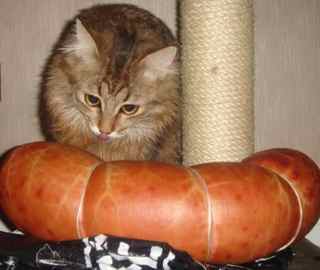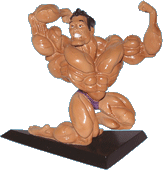Category: "Slang"
Ломать/сломать & ломаться/сломаться

A little while ago I wrote about words that can have multiple meanings because of their use in Russian slang. The verb «ломать» as well as its reflexive form «ломаться» are also such words.
The main meaning of this verb is “to break”. However, someone could say меня ломает to express a feeling of withdrawal after using drugs or when being sick and running high fever. Consequently, the word for withdrawals is «ломка».
| Когда моя кошка опрокинула вазу, тюльпаны упали на пол и их стебли сломались. | When my cat knocked a vase over, the tulips fell on the floor and the stems got broken. |
| — Катя, зачем ты сломала Ленину куклу? — Потому, что она не давала мне с ней играть! |
“Katya, why did you break Lena’s doll?" “Because she wouldn’t let me play with it!” |
| На улице было очень скользко. Я упала и сломала руку! | It was very slippery outside. I fell and broke my arm. |
| — Почему Костя так себя ведёт? — Его ломает: он пытается бросить принимать наркотики. |
“Why is Kostya acting this way?” “He’s having withdrawals from trying to quit taking drugs.” |
There is also a rather well used idiom using this verb: «ломать себе голову». It means to puzzle or rack one's brains over something.
| Я ломаю себе голову, пытаясь понять, как это случилось. | I am puzzled trying to understand how it happened. |
The reflexive form, ломаться, means to quit working or functioning.
| У меня поломалась машина, можешь подвезти? | My car broke; could you give me a ride? |
However, ломаться can also mean, “crack” when referencing changes in a young’s man’s voice.
| У Васи голос уже ломается, он становится мужчиной. | Vasya’s voice is cracking; he’s becoming a man. |
Also, ломаться has two other meanings in Russian slang. The first one is to "put on airs, while the second one is to "stubbornly refuse to concede".
| Ну что ты ломаешься? Не можешь нормально говорить? | Why are you putting on airs? Can’t you speak normally? |
| Дима, тебя все упрашивают, а ты ломаешься! Ну, кто так делает? | Dima, everyone is begging you and you are stubbornly refusing! Who does that? |
Here's a video from Kira Muratova's movie. Her movies are always very unique. More often than not the main character is played by Renata Litvinova, who is the queen of putting on airs.
If you would like to see a transcript and translation of this clip, click here.
Колбасить и колбаситься

It is interesting how some slang words in Russian are formed from something completely unrelated. The words колбасить and колбаситься would seem to come from the word колбаса “sausage” or “salami”; however, in reality, they have nothing to do with it.
If someone says, «меня колбасит», don’t just assume they want to have a salami sandwich... ![]() What they probably mean is that they feel weird for whatever reason. They may be under drug or alcohol influence, sick or just nervous.
What they probably mean is that they feel weird for whatever reason. They may be under drug or alcohol influence, sick or just nervous.
| — По-моему мне что-то подсыпали в сок, меня колбасит! — Не может быть! Кто мог такое сделать? |
“I think that someone slipped something into my juice; I’m feeling weird!” “No way! Who would do such a thing?” |
| Когда у меня был жар, меня так колбасило, что мне всякие монстры мерещились! | When I had a fever, I was feeling so weird; it seemed that I saw some monsters! |
| — Почему вы такие бледные? — Нас колбасит перед спектаклем: мы боимся, что забудем слова! |
“Why are you so pale?” “We are freaking out before the performance; we are afraid that we’ll forget the words!” |
However, sometimes this word can be used to express a positive feeling:
| Хорошо, что я выпил Ред Бул. У меня теперь столько энергии, меня аж колбасит! | I’m glad I drank Red Bull. I have so much energy now, I’m rockin’! |
The word колбаситься means "to have fun", while dancing, relaxing, and acting silly and often irresponsible. ![]()
| Imperfective | Perfective | |
| Infinitive | колбаситься | поколбаситься |
| Past | колбасился колбасилась колбасилось колбасились |
поколбасился поколбасилась поколбасилось поколбасились |
| Present | колбашусь колбасишься колбасится колбасимся колбаситесь колбасятся |
No such thing as perfective present in Russian. |
| Future |
буду колбаситься будешь колбаситься будет колбаситься будем колбаситься будете колбаситься будут колбаситься |
поколбашусь поколбасишься поколбасится поколбасимся поколбаситесь поколбасятся |
| Imperative | колбасься колбaсьтесь |
поколбасься поколбaсьтесь |
| Пойдём сегодня вечером в клуб – поколбасимся! | Let’s go to a club tonight – it’ll be a good time! |
«Колбаса» in Russian slang is used to describe something enjoyable and of a good quality, while «колбасня» a fun time, a wild party or generally something worth experiencing.
I think I used these words the most while living in a dorm in Israel during my high school years. My friends and I колбасились “had fun” at so many different колбасня’s “great parties.” Even though sometimes нас колбасило “we were freaking out” before our exams, we tried to calm down because a well-written exam is another reason to поколбаситься “relax and have some silly fun”! ![]()
Супер-пупер
Ever since I started writing blog entries, my friends have been begging me to write about «супер-пупер». This expression is similar to “super-duper” in meaning but, because of the obvious references, it sounds much funnier in English. ![]() The first time they heard me saying it, they could not stop laughing.
The first time they heard me saying it, they could not stop laughing.

| — Как тест прошёл? — Супер-пупер! |
“How did your test go?” “Super-duper!” |
| Я такой супер-пуперский фильм видел! |
“I saw such a super-duper movie!” |
| Моя жена супер-пуперски готовит Биф-Строганоф! |
“My wife's Beef Stroganoff is super-duper!” |
Just like in English, «супер-пупер» is formed in consonance with «супер» "super". I wonder why it is «пупер», though. Maybe it has something to do with «пуп» or «пупок», "belly button." In Russian «Пуп Земли» means "The Navel of the Earth", a cosmological notion of the center of the world in various religious and mythological traditions. It is a very important and holy place, a place where God sits. (source) It might be a little too far fetched but it seems that «супер-пупер», which essentially means "the greatest", is associated with the holy place.
As it often happens with slang, expressions come and go; words that seemed so popular just recently are being replaced by the even newer ones. Likewise, «супер-пупер» is no longer a commonly used expression; however, people will not look at you funny if you use it. It will just make them smile. ![]()
Качок
Качок is gym slang for a guy who is trying to put on a ton of muscle:
| Как правило качками называют бодибилдеров. | As a rule body-builders are called “качки.” |
For a neat reference of body-building terminology and gym slang, see this forum.

Бум-бум
Every once in a while Russian throws you something so absurd that you just can't believe it, and today we'll see it in the slang phrase бум-бум which means "don't/doesn't understand":
| Он в математике ни бум-бум. | He doesn't understand mathematics at all. |
| Я по-французски ни бум-бум. | I don't undersand French at all. |
| Не будем говорить о вещах, в которых мы ни бум-бум. | Let's not talk about things that we don't understand. |
Notice that in this phrase we write ни and not не. That's because ни бум-бум is really the equivalent of ничего, not the equivalent of a verb.
If you're in the mood for a pop song that contains the phrase бум-бум in this meaning, take a look at this video and translation of the song «Бум, бум, бум» by the group Любовные истории.